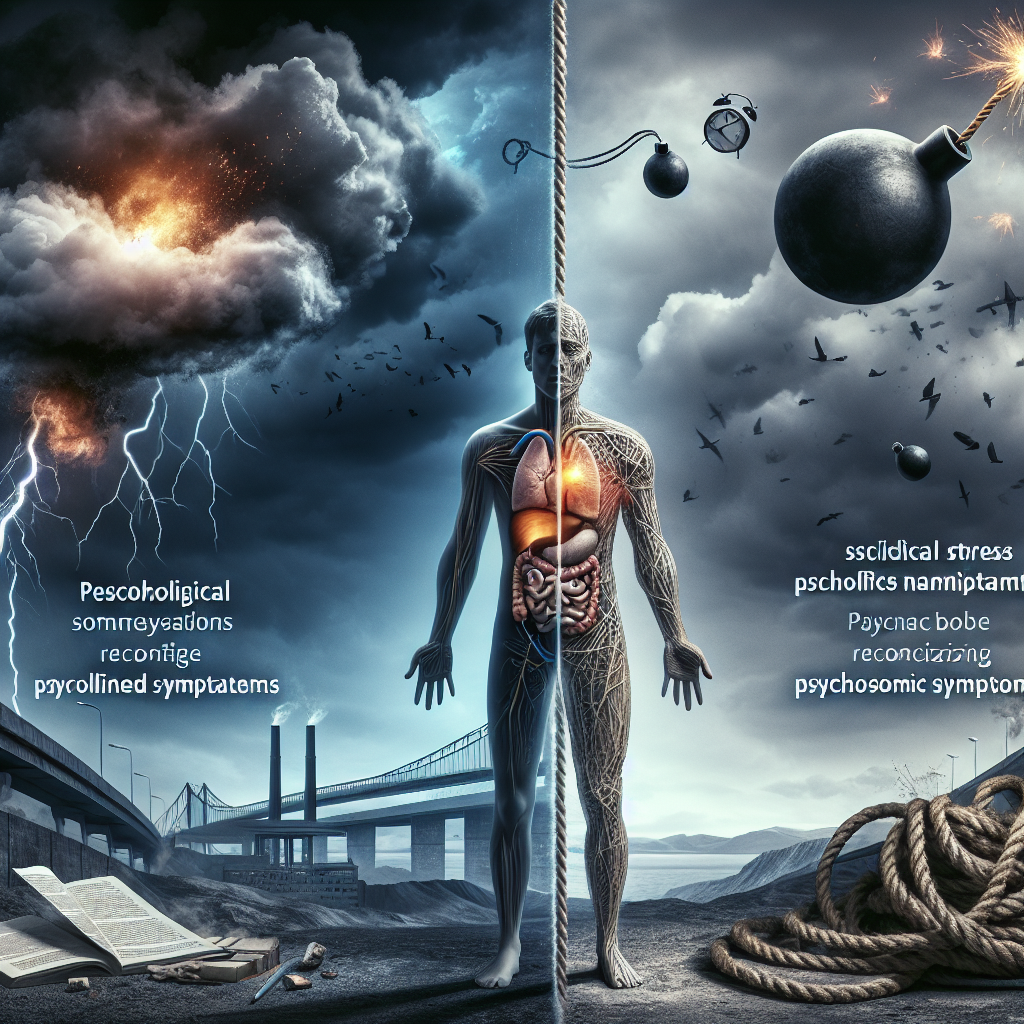Introduction
In today’s fast-paced world, the weight of stress can lead to an array of unexpected health issues. The phrase "When Stress Takes a Toll: Recognizing Psychosomatic Symptoms" is more than just a catchy title; it symbolizes a crucial insight into the intricate web connecting our mental state and physical health. While many often dismiss the mind-body relationship, recognizing the psychosomatic symptoms stemming from stress can be the first step toward healing and regaining control over one’s life. In this article, we will explore the nuances of psychosomatic symptoms, supported by case studies and actionable insights to help you find your balance.
Understanding Psychosomatic Symptoms
Psychosomatic symptoms represent a fascinating interplay between the mind and body. Here, we will delve deep into what they are, how they manifest, and the various factors contributing to their emergence.
What Are Psychosomatic Symptoms?
Psychosomatic symptoms are physical manifestations of psychological issues. Common examples include:
- Chronic pain
- Fatigue
- Digestive problems
- Skin disorders
These symptoms often arise not from underlying medical conditions but rather from psychological stressors such as anxiety, depression, or unresolved emotional conflicts.
The Science Behind Psychosomatic Symptoms
Research shows that stress can trigger the body’s fight-or-flight response, leading to the release of hormones like cortisol and adrenaline. These hormones, when consistently elevated, can wreak havoc on bodily systems, showing up as psychosomatic symptoms. Understanding this physiological response is essential in recognizing when stress takes a toll.
Common Psychosomatic Symptoms
Below, we outline some common psychosomatic symptoms and their psychological correlates:
| Symptom | Possible Psychological Reason |
|---|---|
| Chronic headaches | Anxiety or unresolved conflicts |
| Gastrointestinal issues | Stress or emotional turmoil |
| Muscle tension or pain | Overwhelm or chronic stress |
| Skin issues (e.g. eczema) | Anxiety or self-esteem issues |
Case Study 1: Chronic Headaches
Maya, a 32-year-old project manager, experienced frequent migraines. Her busy work schedule and personal life were often overwhelming. Despite extensive medical tests showing no underlying issues, her headaches persisted. Upon seeking therapy, she discovered that unresolved stress and workplace anxiety were significant contributors, highlighting the vitality of recognizing psychosomatic symptoms.
Stress and Its Impact on the Body
How Stress Manifests Physically
When stress becomes chronic, it can create a cascade of physical symptoms. This section will explore how different types of stressors lead to various physical manifestations.
Acute vs. Chronic Stress
- Acute Stress: Short-term stress that triggers an immediate response in the body.
- Chronic Stress: Continuous stress that can lead to long-term health issues.
Case Study 2: Digestive Issues
Ryan, a 45-year-old lawyer, began experiencing severe digestive problems during a high-stakes trial. Medical evaluations revealed nothing abnormal. It was only through lifestyle adjustments and stress management that he learned to address the psychological factors contributing to his gastrointestinal distress. His journey emphasizes the need for recognizing psychosomatic symptoms in stress management.
Recognizing When Stress Takes a Toll
Signs to Look Out For
Recognizing when stress takes a toll is pivotal in addressing psychosomatic symptoms effectively. Signs include:
- Persistent fatigue
- Frequent illness
- Changes in sleep patterns
- Mood swings
Case Study 3: Skin Issues
Lila, a high school teacher, developed eczema during a particularly stressful academic year. Despite using topical treatments, her condition worsened. After addressing her emotional well-being through counseling, she noticed a significant improvement in her skin. Her experience underscores the importance of recognizing psychosomatic symptoms in overall health management.
Strategies for Managing Stress and Psychosomatic Symptoms
Mindfulness and Relaxation Techniques
To combat stress, mindfulness practices can be incredibly beneficial. Techniques like meditation, yoga, or deep-breathing exercises help calm the mind and can reduce the manifestation of psychosomatic symptoms.
Cognitive Behavioral Therapy (CBT)
Cognitive Behavioral Therapy is an effective approach for identifying and changing negative thought patterns that contribute to psychosomatic symptoms.
Lifestyle Changes
Incorporating regular exercise, balanced nutrition, and adequate sleep can help mitigate stress and its physical manifestations.
Case Study 4: Effective Lifestyle Changes
Mark, a software engineer, struggled with chronic back pain linked to stress. After recognizing the psychosomatic symptoms, he began yoga and adopted healthier eating habits. Over time, he felt less stressed and noticed a remarkable reduction in pain, emphasizing the transformative power of lifestyle changes.
Conclusion
In conclusion, understanding "When Stress Takes a Toll: Recognizing Psychosomatic Symptoms" is essential for anyone looking to improve their health. By recognizing the intricate interplay between mental and physical health, individuals can take significant steps toward leading a more balanced life. From mindfulness to lifestyle changes, there are numerous strategies available to combat stress and its manifestations. Take the first step towards awareness and healing today—your mind and body will thank you.
FAQs
1. What are psychosomatic symptoms?
Psychosomatic symptoms are physical ailments that arise from psychological stressors and emotional conflicts rather than direct physical causes.
2. How can I recognize psychosomatic symptoms?
Common signs include chronic pain, fatigue, sleep disturbances, and digestive issues. Pay attention to both emotional and physical changes.
3. Can stress lead to long-term health issues?
Yes, chronic stress can result in serious long-term health conditions, including cardiovascular diseases and autoimmune disorders.
4. How can I manage stress-related symptoms effectively?
Implementing mindfulness practices, engaging in therapy, exercising regularly, and maintaining a balanced diet can help manage stress and its symptoms.
5. Can psychosomatic symptoms be reversed?
With proper understanding and treatment, many psychosomatic symptoms can be alleviated or reversed by addressing the underlying psychological issues.
This structured approach, focusing on insights and real-life examples, provides a comprehensive understanding of the relationship between stress and psychosomatic symptoms, aiming to empower readers to recognize and address their own experiences.

